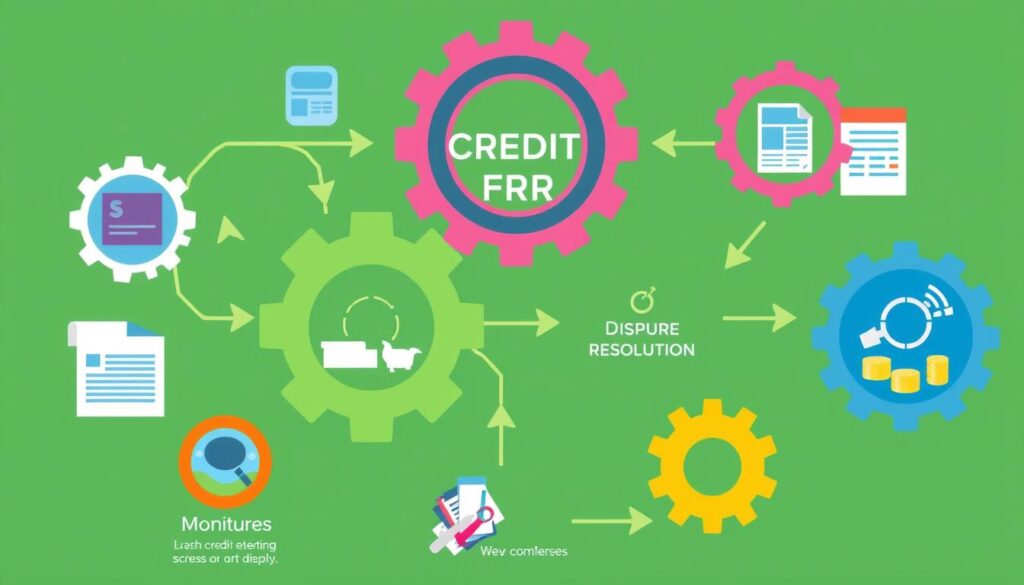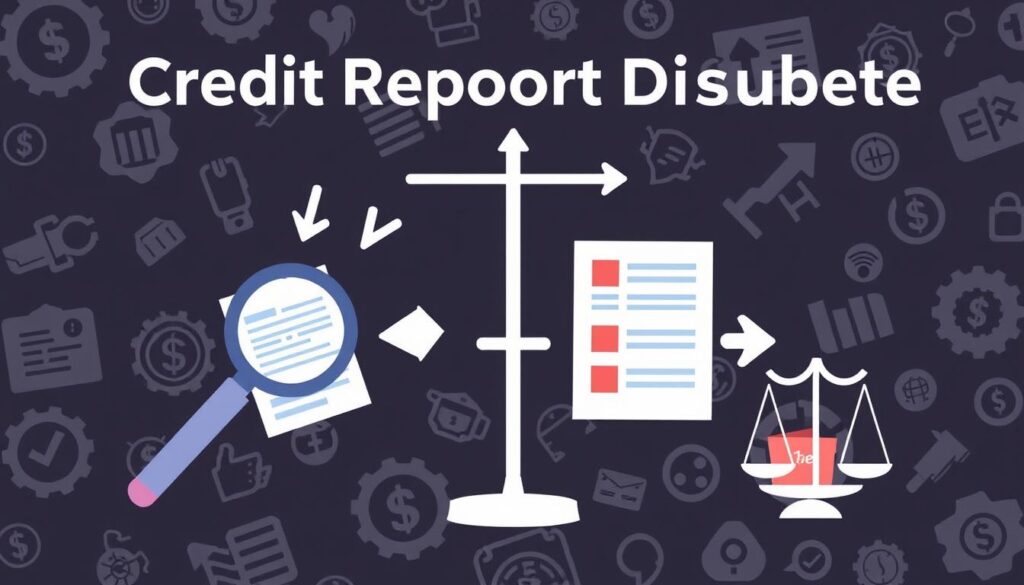A good credit score is vital in today’s world. It affects loans, credit cards, and even rental agreements. This guide offers strategies to quickly boost your credit score.
You’ll learn to spot and fix common credit errors. We’ll show you how to dispute mistakes on your reports. You’ll also discover ways to negotiate with creditors.
By the end, you’ll have tools to control your financial future. You’ll be ready to unlock better financial opportunities.
Key Takeaways
- Understand the importance of a good credit score and its impact on your financial well-being.
- Identify common credit mistakes that can negatively affect your creditworthiness.
- Learn effective strategies to dispute errors on your credit reports and negotiate with creditors.
- Discover the role of credit repair companies and how to choose the right service provider.
- Develop a plan to maintain a healthy credit score and protect your credit rights.
Understanding the Importance of a Good Credit Score
Your credit score is crucial for your financial well-being. This three-digit number affects your ability to get loans and credit cards. It also influences housing and job opportunities.
A good credit score can lead to better interest rates and loan terms. It reflects your creditworthiness and impacts your financial well-being. Lenders and employers use this score to assess your reliability.
A high credit score shows responsible financial management. It signals to lenders that you’re a low-risk borrower. This can result in lower interest rates on various loans.
A poor credit score can have serious consequences. It may limit your access to credit and lead to higher interest rates. It can also affect your housing and employment options.
Building and maintaining a strong credit health significance is vital. By improving your credit score, you can unlock many financial opportunities. This can help secure a brighter future.
“Your credit score is the gatekeeper to your financial future. Treat it with the respect it deserves.”
Your credit score is a powerful tool for your financial aspirations. Prioritizing credit score importance can lead to long-term financial success. Taking steps to maintain a healthy credit profile is key.
Common Credit Mistakes and Their Impact
A strong credit profile is key for financial stability. It helps secure better borrowing terms. Many people make credit mistakes that hurt their creditworthiness.
Late payments and high credit use are common issues. These can seriously damage your credit score. Let’s explore how these mistakes affect your financial health.
Late Payments and Delinquencies
Failing to pay bills on time is a major credit-damaging behavior. One late payment can hurt your credit for years. It can stay on your report for up to seven years.
Missed payments or accounts in collections are even worse. These can cause your credit score to drop sharply. They also have long-lasting late payment consequences.
High Credit Utilization Ratios
Using too much of your available credit is another credit mistake to avoid. This is called your credit utilization ratio. It’s a big factor in your credit score.
Try to keep your credit use below 30% of your limit. Higher ratios can signal financial trouble. This can lead to a lower credit score.
Understanding these credit-damaging behaviors is crucial. Take steps to address them. This can improve your credit profile and open up financial opportunities.
The Rapid Credit Repair Process Explained
Boosting your credit score can be simple. This guide outlines key actions to quickly improve your creditworthiness. You’ll learn about steps to improve credit score and credit repair strategies to reach your financial goals.
The rapid credit repair process involves strategic steps to fix your credit profile. Let’s explore these credit rehabilitation techniques in detail:
- Obtain Your Credit Reports: Request reports from major bureaus to understand your current credit standing. This helps identify issues that need attention.
- Identify Errors and Inaccuracies: Review your reports for mistakes that may hurt your credit score. Look for incorrect account info or fraudulent activity.
- Dispute Negative Items: Challenge issues with credit bureaus. Use effective dispute letter writing and provide evidence to support your claims.
- Negotiate with Creditors: Try to remove or change negative items on your report. This may involve payment plans, settlements, or account removals.
These steps to improve credit score will help repair your credit fast. The credit repair process overview is powerful, but needs patience and strategy for best results.
| Credit Repair Strategy | Description | Potential Impact |
|---|---|---|
| Dispute Negative Items | Challenge inaccurate, incomplete, or unverifiable information on your credit report | Can lead to the removal of negative items, resulting in a significant boost to your credit score |
| Negotiate with Creditors | Work with creditors to modify or remove negative items through payment arrangements or settlements | Can help improve your credit utilization ratio and payment history, leading to a better credit score |
| Reduce Credit Utilization | Pay down credit card balances to lower your overall credit utilization ratio | A lower credit utilization ratio is a key factor in improving your credit score |
Use these credit repair strategies to achieve financial success. The credit rehabilitation techniques here are just the start. With effort, you can overcome credit challenges and unlock new opportunities.

Step 1: Obtain Your Credit Reports
Getting your credit reports is crucial for rapid credit repair. You’ll need reports from Experian, Equifax, and TransUnion. These reports help identify errors affecting your credit score.
Accessing your credit reports is simple and quick. It’s the first step to address issues impacting your credit score.
Requesting Reports from Major Credit Bureaus
You can obtain credit reports from credit bureau websites or AnnualCreditReport.com. This site offers free annual reports from all three bureaus. For more frequent updates, contact bureaus directly.
To obtain credit bureau report acquisition, follow the instructions on their websites. You’ll need to provide personal information to verify your identity.
- Visit Experian, Equifax, and TransUnion websites to request credit reports
- Use AnnualCreditReport.com for free yearly reports from all bureaus
- Provide personal info to request credit report access and ensure accuracy
Obtaining credit reports is key to identifying credit score issues. This first step sets the foundation for rapid credit repair.
Step 2: Identify Errors and Inaccuracies
Reviewing your credit reports is key to rapid credit repair. Identifying errors or inaccuracies is crucial. These issues can seriously harm your credit score.
Check your reports for credit report errors and credit report inaccuracies. Look for wrong account info, payment histories, or accounts not yours. This credit report item verification can uncover fraud or mistakes hurting your score.
- Scrutinize your credit reports for any identify credit report errors related to account information, payment histories, or fraudulent activity.
- Ensure that all accounts and credit report inaccuracies listed on your reports are accurate and belong to you.
- Highlight any credit report item verification issues that require further investigation or dispute credit report inaccuracies.
Careful review of your credit reports helps find issues affecting your score. This step prepares you for the next phase of rapid credit repair.
| Common Credit Report Errors | Potential Impact |
|---|---|
| Incorrect account information | Lowers credit score, makes it harder to get approved for loans or credit cards |
| Erroneous late payments | Negatively affects payment history, a key factor in credit score calculations |
| Fraudulent accounts or inquiries | Damages credit utilization ratio and creditworthiness |
Step 3: Dispute Negative Items
Spotting errors on your credit report is just the beginning. The real challenge lies in disputing those negative items. This process is vital for boosting your credit score and ensuring accuracy.
Effective Dispute Letter Writing
A well-crafted dispute letter is crucial for removing problematic items from your credit history. Here are some tips to help you write an effective dispute letter:
- Be specific about the item you’re disputing and explain why it’s inaccurate or invalid.
- Gather supporting documentation, such as receipts, payment records, or correspondence with the creditor.
- Request that the credit bureau investigate the item and provide you with a written response within the legally mandated timeframe.
- Keep your letter concise and to the point, focusing on the facts rather than emotional appeals.
- Send your dispute letter via certified mail with a return receipt to create a paper trail.
These dispute letter writing techniques can help you challenge negative items on your credit report. They’ll improve your credit report dispute process and credit report error correction.
| Dispute Letter Dos | Dispute Letter Don’ts |
|---|---|
|
|

“Effective dispute letter writing is the key to successfully removing inaccurate or invalid items from your credit report.”
Step 4: Negotiate with Creditors
Negotiating with creditors is a powerful strategy for rapid credit repair. It involves direct communication to improve terms and settle debts. This approach can significantly enhance your overall credit profile.
Understanding creditors’ perspectives is crucial. They often work with consumers who show genuine willingness to resolve debts. A collaborative mindset can help you achieve better results.
Use credit repair negotiation techniques to your advantage. You can reduce interest rates, settle accounts, or create manageable repayment plans.
- Negotiate reduced interest rates or fees on existing accounts
- Arrange for credit account settlements or lump-sum payments to resolve outstanding debts
- Establish manageable debt repayment plans that fit your budget
- Request the removal of negative items from your credit report in exchange for payment
Use effective creditor communication strategies. Be polite, professional, and persistent in your outreach. Document all interactions and agreements reached.
“Negotiating with creditors is a delicate dance, but one that can yield significant improvements to your credit profile when executed properly.” – Credit Repair Expert, Jane Doe
The goal is to resolve debts and improve your credit report. Proper negotiating with creditors can pave the way for a brighter financial future.
Rapid Credit Repair Strategies
Improving your credit score quickly requires a multi-pronged approach. Two key strategies are credit utilization reduction and debt consolidation and settlement. These methods can effectively boost your credit profile and open doors to better financial opportunities.
Credit Utilization Reduction
Your credit utilization ratio significantly impacts your credit score. This ratio shows how much of your available credit you’re using. To manage your credit utilization effectively, follow these steps:
- Identify high-balance credit cards and prioritize paying them down.
- Request credit limit increases from your card issuers to lower your utilization.
- Consolidate multiple cards onto a single card with a lower interest rate.
Debt Consolidation and Settlement
Debt consolidation and debt settlement are powerful strategies for rapid credit repair. These methods can simplify payments, reduce interest rates, and potentially lower your total debt.
Debt consolidation combines multiple debts into one manageable payment, often at a lower interest rate. This can improve your credit utilization and payment history. Debt settlement involves negotiating with creditors to reduce your overall debt.
| Rapid Credit Repair Strategies | Benefits |
|---|---|
| Credit Utilization Reduction | – Lowers your credit utilization ratio – Improves your credit mix – Demonstrates responsible credit management |
| Debt Consolidation and Settlement | – Simplifies your payment structure – Reduces interest rates and total debt – Accelerates debt resolution and credit score improvement |
Using these credit utilization management and debt consolidation benefits can boost your credit score. Implementing debt settlement strategies and credit repair techniques will help you achieve rapid credit improvement.
The Role of Credit Repair Companies
Many people opt for professional credit repair companies to improve their credit profiles. These companies offer specialized credit repair services and expert assistance to help individuals achieve their financial goals.
Credit repair companies excel at navigating the complex world of credit reporting. They understand the credit rehabilitation process deeply and can spot inaccuracies on your credit reports effectively.
These companies often have strong relationships with creditors. This allows them to negotiate on your behalf, leading to faster dispute resolutions.
It’s crucial to choose a reputable credit repair company to avoid scams. Look for firms with a proven track record and positive reviews.
“Working with a credit repair company was a game-changer for me. They were able to identify errors on my credit report and get them resolved in a fraction of the time it would have taken me to do it myself.”
The choice to use a credit repair company depends on your situation. For many, their expertise can be invaluable in achieving rapid credit repair.

Choosing the Right Credit Repair Service
Picking a good credit repair company is key to boosting your credit score. Focus on their reputation, track record, and success rates. These factors will help you make the best choice.
Evaluating Reputation and Success Rates
Research the company’s reputation before sharing your credit info. Look for client reviews and check their Better Business Bureau standing. Make sure they have proper licenses for your state.
A good credit repair firm should be open about their methods. They should also share details on how they’ve helped improve credit scores. This info helps you gauge their effectiveness.
| Credit Repair Service | Average Credit Score Increase | Client Satisfaction Rating | Years in Business |
|---|---|---|---|
| ABC Credit Repair | 42 points | 4.8/5 | 8 |
| XYZ Credit Solutions | 38 points | 4.5/5 | 6 |
| 123 Credit Experts | 35 points | 4.2/5 | 4 |
Comparing credit repair service providers helps you make a smart choice. Look at their reputation and success rates. This approach aligns with your credit repair goals and boosts your chances of success.
“Choosing the right credit repair provider can make all the difference in improving your credit score and financial well-being.” – Financial Advisor, John Smith
Maintaining a Healthy Credit Score
Good credit habits are key to long-term financial health. Let’s explore strategies for keeping your credit score strong. These tips will help you maintain good credit for years to come.
Regular credit report checks can catch issues early. Low credit card balances show responsible use. On-time payments are crucial for a healthy credit score.
- Regularly Monitor Your Credit Reports: Continuously reviewing your credit reports from the major bureaus can help you identify and address any discrepancies or negative items in a timely manner.
- Practice Responsible Credit Utilization: Keeping your credit card balances low, ideally below 30% of your available credit limit, is crucial for maintaining a healthy credit score.
- Make Payments on Time: Consistently making on-time payments for all your bills and credit obligations is one of the most significant factors in sustaining good credit.
- Diversify Your Credit Mix: Having a variety of credit types, such as credit cards, loans, and mortgages, can demonstrate your ability to manage different types of credit responsibly.
- Limit New Credit Applications: Applying for too many new credit accounts in a short period can temporarily lower your credit score, so be mindful of your credit inquiries.
Mix up your credit types to show financial skill. Be careful with new credit applications. These habits will keep your credit score healthy.
| Credit Score Maintenance Tip | Benefit |
|---|---|
| Monitor Credit Reports Regularly | Identify and address errors or negative items |
| Maintain Low Credit Utilization | Demonstrate responsible credit management |
| Make Timely Payments | Strengthen payment history, a key factor in credit scores |
| Diversify Credit Mix | Show your ability to handle different types of credit |
| Limit New Credit Applications | Avoid temporary credit score dips from hard inquiries |
These credit score maintenance strategies will keep your finances healthy. Make them part of your routine for lasting financial success.
“Maintaining a good credit score is like caring for a garden – it requires consistent effort and attention to keep it thriving.”
Rapid Credit Repair: Success Stories
Real-life examples prove the effectiveness of credit repair strategies. These stories showcase remarkable credit score improvements achieved through dedication and smart techniques.
Sarah, a young professional, struggled with a low credit score. She followed our guide’s steps to dispute inaccuracies and negotiate with creditors. In six months, Sarah’s credit score increased by 87 points.
This opened new opportunities for her financial future.
“I never thought I could turn my credit around so quickly, but this guide gave me the tools and confidence to take control of my finances. I’m so grateful for the insights and practical advice.”
Michael, a small business owner, had previously filed for bankruptcy. He used our credit repair methods to rebuild his score. In just over a year, Michael’s credit score rose from the low 500s to 760.
This improvement helped him secure a better interest rate on a business loan. As a result, Michael was able to grow his enterprise.
| Client Testimonial | Credit Score Improvement | Time Frame |
|---|---|---|
| “The strategies in this guide helped me transform my credit and open up new financial possibilities.” | 87 points | 6 months |
| “I went from a low credit score to an impressive 760, all thanks to the credit repair tactics in this article.” | 260 points | 14 months |
These success stories highlight the power of our comprehensive guide. You can achieve similar results by following the step-by-step process. Implement these strategies to improve your credit score and regain financial freedom.

Rapid Credit Repair for Specific Situations
Rebuilding After Bankruptcy or Foreclosure
Major financial setbacks like bankruptcy or foreclosure can severely impact your credit score. These events may stay on your credit report for up to 10 years. However, specialized techniques can help you rebuild your credit and regain financial stability.
Understanding the impact of these events is crucial for effective credit rehabilitation from financial setbacks. With the right strategies, you can start the process of credit repair post-foreclosure and gradually improve your credit profile.
- Prioritize paying your bills on time: Establishing a consistent track record of on-time payments is crucial in rebuilding your credit after a major financial setback.
- Utilize secured credit cards: Applying for a secured credit card and making timely payments can help you rehabilitate your credit and demonstrate responsible credit behavior.
- Explore credit-building loans: Consider taking out a small, secured loan and making on-time payments to gradually improve your credit mix and credit repair after bankruptcy.
- Dispute inaccuracies: Carefully review your credit reports and dispute any errors or inaccuracies that may be dragging down your credit repair post-foreclosure efforts.
Rebuilding credit after bankruptcy or foreclosure requires time and patience. With consistent effort and the right specialized credit repair strategies, you can improve your credit profile. Remember, it’s possible to achieve a healthy and sustainable credit standing again.
Legally Protecting Your Credit Rights
Knowing your legal safeguards is vital for credit repair. Consumer protection laws empower you to navigate the process confidently. These laws ensure fair treatment from creditors and credit bureaus.
The Fair Credit Reporting Act (FCRA) is crucial for credit rights protection. It sets guidelines for credit bureaus, mandating prompt investigation of disputes. The FCRA requires removal of inaccurate information from credit reports.
The Fair Debt Collection Practices Act (FDCPA) strengthens legal credit repair safeguards. It regulates debt collectors’ activities. The FDCPA prohibits harassment and unfair practices in debt collection.
Understanding these consumer credit law awareness empowers you to exercise your rights effectively. You can get a free annual credit report. Credit bureaus must investigate disputes within a set timeframe.
Knowing these credit-related legislation understanding helps navigate credit repair confidently. It ensures your rights are protected throughout the process. This knowledge is key to your financial well-being.
| Key Legislation | Protections Offered |
|---|---|
| Fair Credit Reporting Act (FCRA) | Requires credit bureaus to investigate disputes and remove inaccurate information |
| Fair Debt Collection Practices Act (FDCPA) | Regulates debt collector activities, prohibiting harassment and unfair practices |
Grasping your legal rights and credit rights protection safeguards is crucial. It empowers you to navigate credit repair confidently. This knowledge ensures your credit-related rights are upheld throughout your financial journey.
Conclusion
Rapid credit repair is achievable for those committed to financial control. This guide provides strategies to quickly boost your credit score. With dedication, you can transform your credit profile and unlock new opportunities.
The credit repair summary offers actionable credit improvement steps. These help with credit score transformation and attaining financial freedom through credit repair. Take charge of your financial future today.
Credit recovery may be challenging, but you can overcome obstacles with the right mindset. Use these insights to build a strong credit profile. Your journey to credit score transformation begins now.

